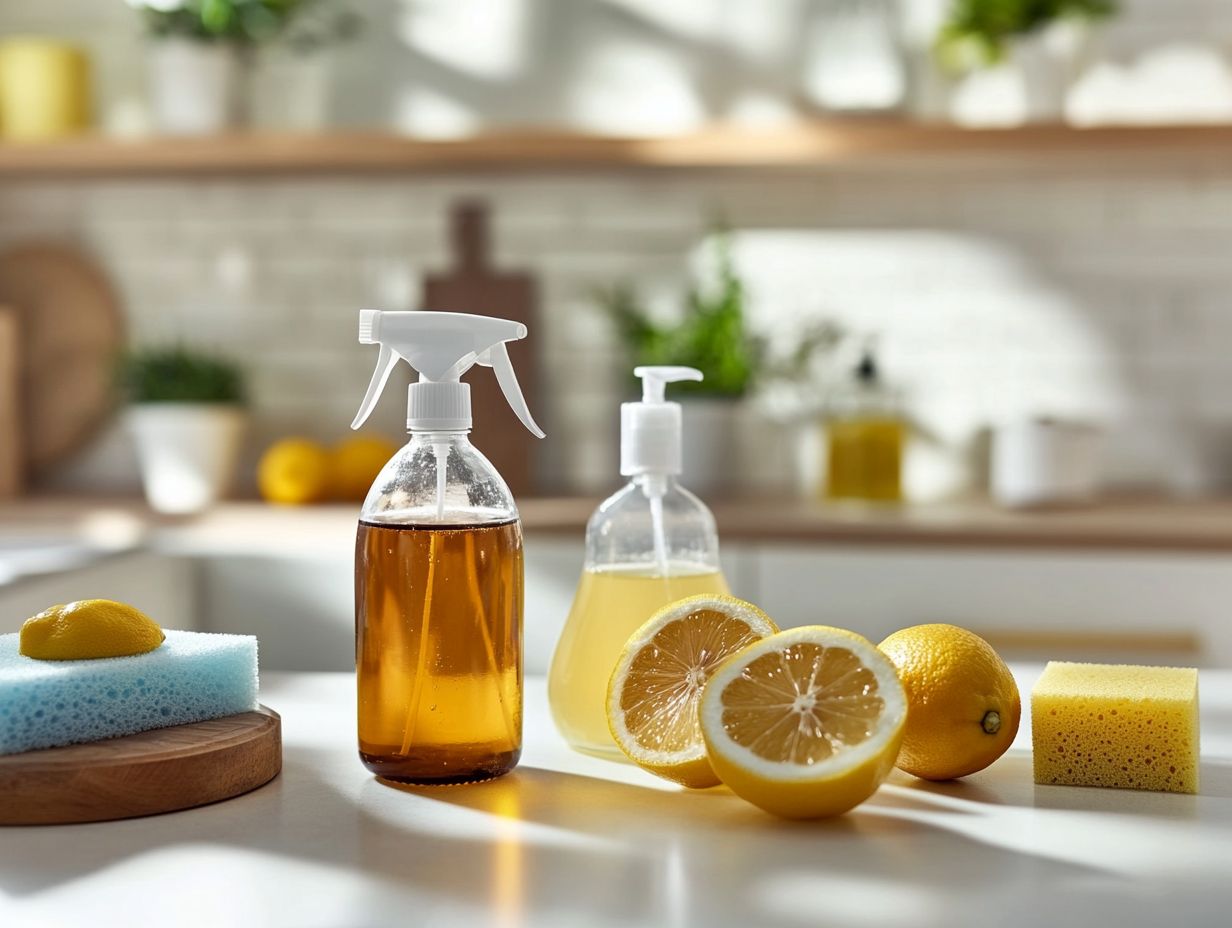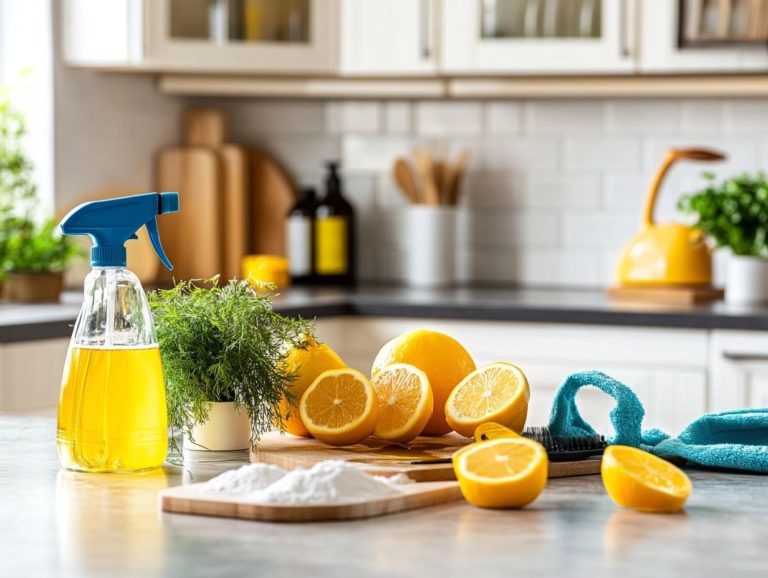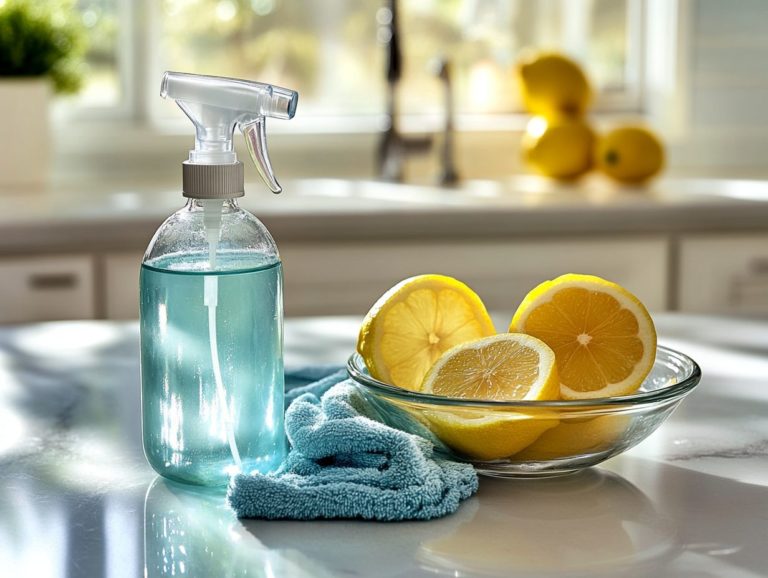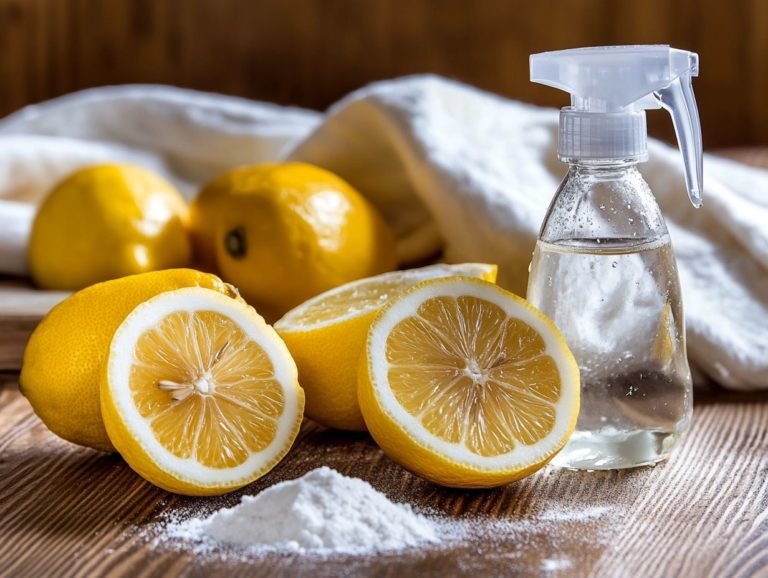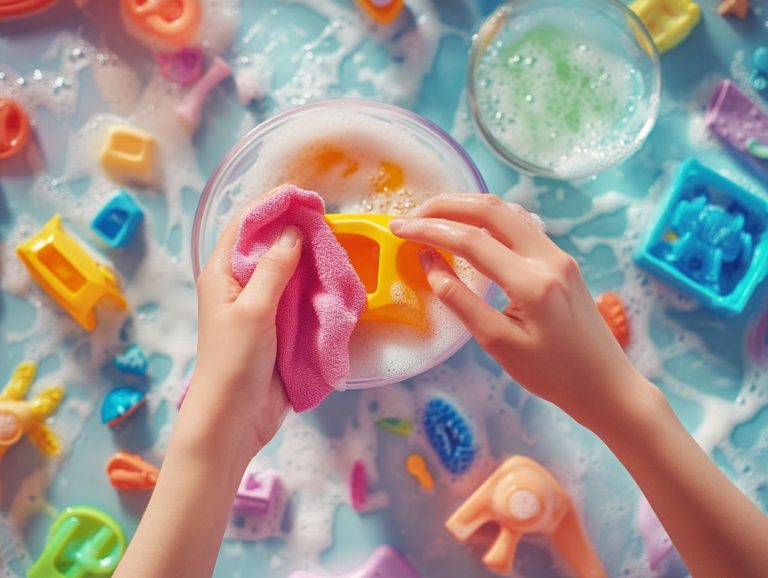Can I Use Citric Acid for Cleaning?
Looking for a powerful cleaning ally? Citric acid, a natural compound abundant in citrus fruits like lemons, is becoming increasingly popular as an eco-friendly cleaning agent and vinegar substitute.
This article delves into its versatile applications in cleaning, ranging from commercial household products to DIY solutions you can create yourself using citric acid powder and essential oil. You’ll explore the myriad benefits of citric acid, including its impressive effectiveness on various surfaces, while also considering essential safety precautions such as proper dilution and ventilation.
You will discover natural alternatives, including using citric acid as a white vinegar substitute, and receive straightforward instructions on crafting your own cleaning solution at home.
Uncover a powerful ally to elevate your cleaning routine with effective and sustainable methods!
Contents
- Key Takeaways:
- What is Citric Acid?
- How is Citric Acid Used for Cleaning?
- Is Citric Acid Safe for Cleaning?
- What Are the Alternatives to Citric Acid for Cleaning?
- How Can I Make a Homemade Cleaning Solution with Citric Acid?
- Frequently Asked Questions
- Can I Use Citric Acid for Cleaning?
- What Types of Surfaces Can I Use Citric Acid On?
- How Do I Use Citric Acid for Cleaning?
- Can I Use Citric Acid Instead of Other Household Cleaners?
- Are There Precautions When Using Citric Acid for Cleaning?
- Can I Use Citric Acid for Cleaning My Dishwasher or Washing Machine?
Key Takeaways:
- Citric acid is a natural cleaning agent that breaks down naturally in the environment and is found in many fruits and vegetables.
- It effectively cleans various surfaces, including kitchen and bathroom fixtures, and helps remove hard water stains and soap scum.
- While citric acid is generally safe for cleaning, it’s important to take safety precautions and avoid using it on materials like marble and granite.
What is Citric Acid?
Citric acid, a gentle yet powerful organic acid, is found abundantly in citrus fruits, particularly in lemons and limes. Its versatility has made it a beloved asset in the cleaning industry.
As a natural component, citric acid stands out as an effective cleaner and a biodegradable substitute for harsh chemicals. This appeals to those who prioritize eco-friendly solutions. It is also a great substitute for white vinegar in many cleaning applications. Beyond enhancing the flavors of your favorite dishes, it possesses impressive antibacterial properties, which is why it has earned its place in both DIY cleaning recipes and commercial cleaning products from brands like Dri-Pak.
How is Citric Acid Used for Cleaning?
Citric acid serves as an exceptional choice for your cleaning needs, thanks to its natural cleaning properties and effectiveness as a biodegradable agent. If you’re looking to maintain pristine surfaces while being kind to the environment, this versatile ingredient is your go-to for green cleaning.
You ll find it frequently featured in cleaning sprays and solutions, where it excels at tackling hard water stains, soap scum, and general bacteria removal.
It has truly established itself as a cornerstone of natural cleaning practices, making your eco-friendly cleaning routine not just effective, but also environmentally responsible and contributing to better environmental practices.
What Types of Cleaning Products Contain Citric Acid?
Citric acid serves as a vital ingredient in a wide array of cleaning products, from commercial cleaners to your favorite homemade solutions. It enhances their ability to tackle tough stains and grime. Its biodegradable nature makes it a preferred choice for eco-conscious brands, allowing you to maintain a pristine environment without compromising your health or harming the planet.
You ll find citric acid commonly featured in descalers, which help remove mineral deposits in your appliances, as well as in all-purpose cleaners designed to combat dirt on various surfaces. Dishwashing detergents also rely on its grease-cutting prowess to ensure sparkling results.
Brands like Seventh Generation, Method, and Ecover proudly incorporate citric acid into their formulations, often boasting certifications from the Environmental Protection Agency’s Safer Choice program. These endorsements validate their claims of being eco-friendly, enabling you to make informed choices that contribute to a cleaner home while supporting sustainability efforts.
How Does Citric Acid Clean Surfaces?
Citric acid is your secret weapon for cleaning surfaces. Its remarkable chemical properties enable it to break down stubborn mineral deposits, limescale, and soap scum. This makes it an effective cleaner for various applications and an essential ally in your quest for a pristine home.
When used in a cleaning spray or solution, citric acid s antibacterial properties go to work. This provides a dual action of cleaning and sanitizing, crucial for maintaining a healthy living space.
The science behind citric acid is genuinely intriguing. Its molecular structure allows it to bind to calcium and magnesium ions commonly found in hard water and grime. A chelating agent like citric acid loosens dirt, making it significantly easier for you to wipe away, especially on surfaces like kitchen counters, bathroom tiles, and glass.
You ll find that citric acid isn’t just for surfaces. You can also use it to clean appliances such as dishwashers and coffee machines, helping them run more efficiently and extending their lifespan.
To get the best results with citric acid, keep these best practices in mind:
- Dilute it with water for general cleaning purposes.
- Always test it on a small area first.
- Allow it to sit for a few minutes to maximize its efficacy before rinsing thoroughly.
What Surfaces Can Citric Acid Be Used On?
Citric acid is your go-to solution for a multitude of surfaces. Its prowess truly shines in kitchen cleaning tasks, effortlessly tackling stubborn hard water stains on faucets and banishing soap scum from sinks. This makes it an ideal household remedy.
In the bathroom, it works wonders for disinfecting and leaving tiles and glass surfaces sparkling clean. This natural agent is perfectly safe for your stainless steel appliances, preserving their shine without the need for harsh chemicals.
It excels on ceramic countertops and can revive plastic containers that have absorbed unwanted odors. However, be cautious when using citric acid on delicate surfaces like marble or granite, as it can lead to etching or damage.
For example, in your kitchen, you can use it to remove residual grime from cutting boards. In the bathroom, it can make quick work of cleaning showerheads and faucets, making it an essential part of your cleaning utensils.
Citric acid stands out as an eco-friendly option for addressing various cleaning challenges throughout your home.
What Are the Benefits of Using Citric Acid for Cleaning?
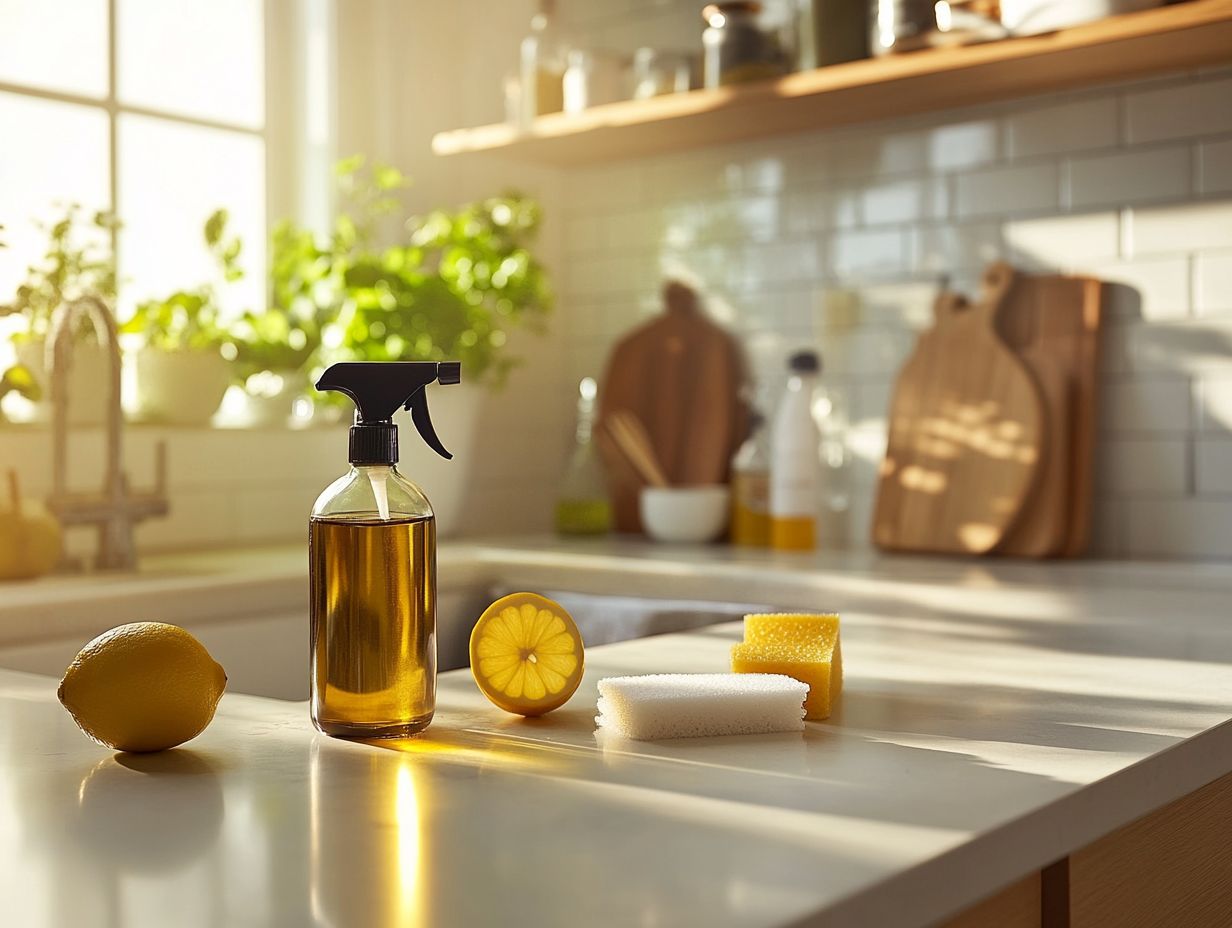
Using citric acid as a natural cleaning agent comes with several advantages. Citric acid cleaning offers many benefits and fits your eco-friendly values perfectly.
It s a biodegradable and non-toxic cleaner, allowing you to tackle tough stains and disinfect surfaces while promoting a healthier living space. All of this can be done without the harsh chemicals that come with conventional cleaning products.
Its versatility shines in various cleaning scenarios. Whether you’re removing limescale from kettles and dishwashers or freshening up surfaces in kitchens and bathrooms, citric acid is your reliable ally.
You can even whip up a powerful cleaning paste by combining citric acid with baking soda. This makes it excellent for tackling tough grime or stubborn soap scum, following the best cleaning hacks!
Unlike traditional cleaning products that are often packed with synthetic fragrances and toxic ingredients, citric acid offers you a safe alternative. This not only protects your health but also helps reduce your ecological footprint.
By choosing such eco-friendly practices, you enhance your cleaning efficacy while contributing to a cleaner, greener planet. Don t wait to experience the incredible cleaning power of citric acid!
Is Citric Acid Safe for Cleaning?
Citric acid is a safe and effective cleaning solution due to its natural origins and non-toxic characteristics. As a biodegradable ingredient in eco-friendly cleaning products, citric acid presents minimal health risks when used properly. This makes it an attractive option for households that prioritize environmental sustainability and healthy cleaning.
What Precautions Should Be Taken When Using Citric Acid for Cleaning?
When using citric acid for cleaning, it s vital to take specific safety precautions to ensure effectiveness and safety. Be well-informed about the proper dilution of citric acid solutions and use the right cleaning tools. Securely store the substance to prevent unintended reactions or health risks.
Wear gloves to protect your skin from irritation that might occur from direct contact with the acid. Maintaining proper ventilation in your cleaning area is essential to disperse any fumes and minimize inhalation risks.
Avoid contact with your eyes, as citric acid can cause discomfort or damage. If you’re preparing homemade cleaning solutions, label them clearly to indicate their contents and provide safe usage instructions, ensuring the best cleaning practices.
If you encounter issues like residues or streaks on surfaces, you may need to adjust the concentration of your solution or change the cleaning method you re using.
Can Citric Acid Cause Any Harm to Surfaces or Materials?
While citric acid is generally regarded as safe, it can potentially damage certain surfaces and materials if not handled carefully. Delicate materials may be adversely affected by the acidic properties of citric acid, so exercise caution and use proper application techniques during cleaning.
For example, marble and specific types of natural stone, which include granite and limestone, are particularly sensitive to citric acid. This can lead to discoloration or surface etching. Conduct a preliminary test by applying a small amount of the solution to an inconspicuous area to assess any potential reaction.
If you notice any signs of damage after testing, consider changing your cleaning solution immediately. Alternatives like a mixture of baking soda and water or a gentle soap designed for sensitive materials can effectively clean without jeopardizing the integrity of the surface.
What Are the Alternatives to Citric Acid for Cleaning?
There are various alternatives to citric acid for cleaning needs, each providing unique advantages tailored to different situations.
One standout option is white vinegar, often recommended as a favored substitute, or a vinegar substitute like lemon juice. Its natural acidity and effectiveness make it a versatile choice for a wide range of household cleaning tasks.
Are There Any Natural Alternatives to Citric Acid for Cleaning?
You have several natural alternatives to citric acid for cleaning, including everyday household ingredients like white vinegar, baking soda, and essential oils. Each of these ingredients offers unique cleaning benefits.
These non-toxic cleaners provide effective solutions for tackling various cleaning challenges while ensuring safety and environmental friendliness. You can even try making homemade cleaning sprays for specific tasks.
White vinegar is particularly adept at cutting through grease and disinfecting surfaces. It is an excellent choice for kitchen cleaning tasks, whether you re wiping down countertops or tackling tough stains on appliances.
Baking soda serves as a gentle abrasive, perfect for scrubbing surfaces without scratching. It excels in the bathroom, especially at removing soap scum and mildew.
When you combine these two ingredients, you create a powerful fizzing reaction that not only helps lift stains but also neutralizes odors. By adding essential oils like tea tree or lavender, you can elevate their cleaning prowess, as these oils boast antibacterial properties.
You ll be amazed at how well these combinations achieve an eco-friendly clean while enjoying a pleasant scent and effectively removing dirt. These natural cleaning methods are great for general disinfecting and maintaining hygiene in your home.
What Are the Benefits and Drawbacks of Using Alternatives to Citric Acid?
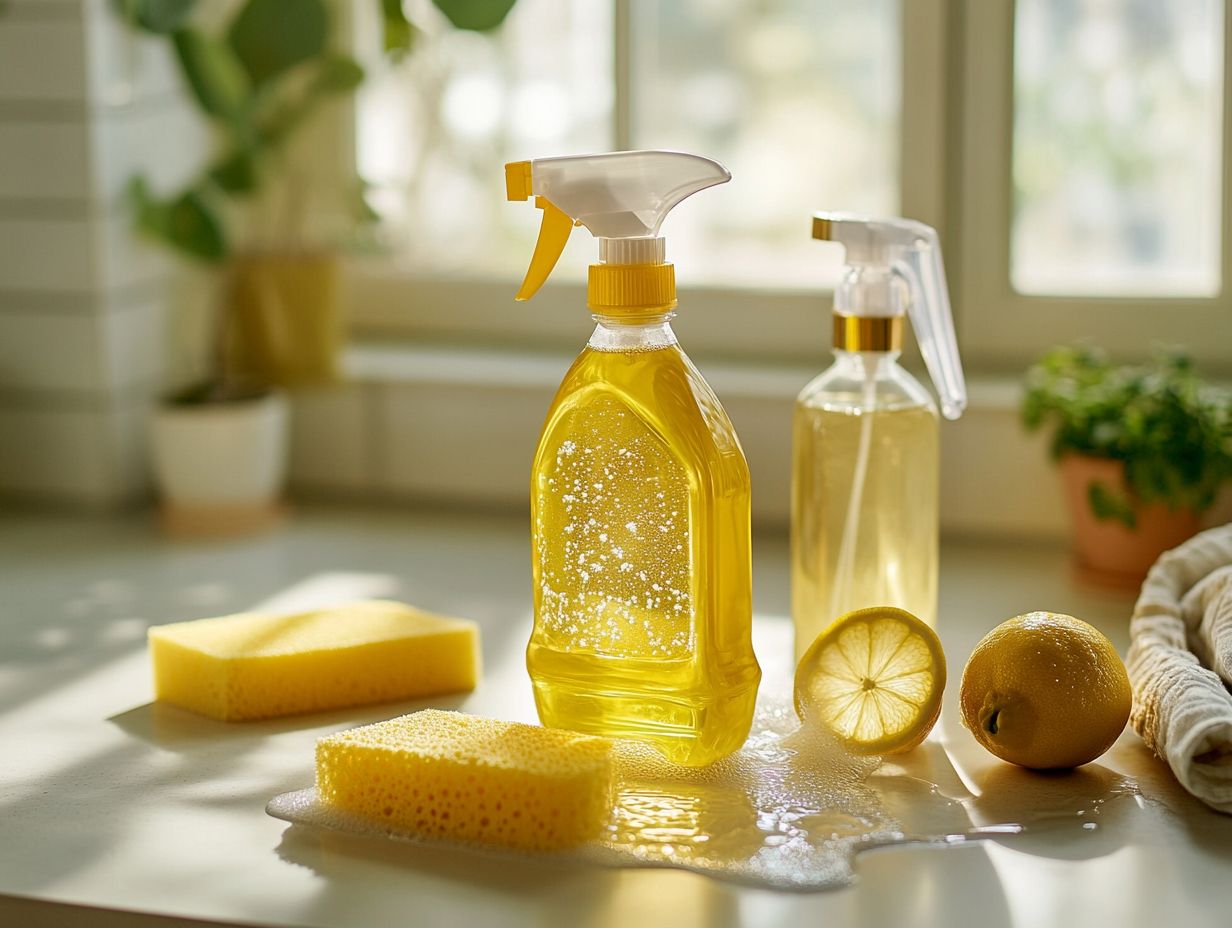
When considering natural alternatives to citric acid for your cleaning needs, it’s important to weigh the benefits and drawbacks of each option. While these alternatives often provide eco-friendly and non-toxic solutions, their effectiveness and range of applications may not quite match up to citric acid.
Take white vinegar and baking soda, for example. These two are celebrated for their ability to cut through grease, deodorize areas, and tackle stubborn stains without harming the environment.
The acetic acid in white vinegar (a type of acid that helps with cleaning) makes it particularly effective at removing hard water deposits. Baking soda acts as a gentle abrasive, making it ideal for scrubbing various surfaces.
These safe for the environment options are excellent for everyday household cleaning tasks. However, keep in mind that these natural alternatives might struggle with more challenging tasks, like heavy-duty mold or mildew infestations, where citric acid’s powerful antibacterial properties really shine.
Therefore, understanding the specific cleaning scenarios where each solution excels is crucial. This knowledge will help you make well-informed choices and employ effective cleaning methods.
How Can I Make a Homemade Cleaning Solution with Citric Acid?
Crafting a homemade cleaning solution with citric acid is an elegant endeavor that gives you the power to tap into the remarkable potency of this natural cleaning agent for your home.
By following a straightforward recipe, you can blend citric acid with other everyday ingredients to formulate an effective, eco-friendly cleaning solution customized for your unique cleaning needs.
This approach aligns with healthy cleaning and environmental practices. Start your eco-friendly cleaning journey today!
What Ingredients Do I Need for a DIY Citric Acid Cleaning Solution?
Are you ready to tackle cleaning naturally? To create your own DIY citric acid cleaning solution, you will need just a few simple ingredients that are likely already in your kitchen. The star of the show is citric acid, which you can find in powder form, along with water, white vinegar, and optional essential oils to elevate the fragrance and add some antibacterial benefits. This citric acid solution is both a natural and an effective cleaner.
Citric acid is your go-to substance that reduces foam, effortlessly dissolving mineral deposits from water that can leave stains, making it particularly adept at tackling hard water buildup.
White vinegar enhances your solution s grease-cutting ability and neutralizes unpleasant odors. Water serves as the perfect solvent, diluting the other ingredients to achieve the ideal consistency. These ingredients together make a powerful homemade cleaning solution.
If you’re in the mood for a pleasant scent or an extra boost in cleaning power, consider adding essential oils like tea tree or lavender, each bringing its own unique advantages. When you’re on the hunt for citric acid powder, look to health food stores or reputable online retailers to find high-quality options; you ll likely discover essential oils there as well, allowing you to craft a fresh and effective cleaning solution tailored for various tasks around the kitchen or bathroom. Brands like Dri-Pak offer quality citric acid products.
What Are the Steps to Make a Citric Acid Cleaning Solution?
Creating your own citric acid cleaning solution is a straightforward process that gives you the power to tailor an effective cleaner to your specific needs. Begin by dissolving citric acid powder in warm water. Next, mix in white vinegar, and if you wish, add essential oils to elevate both the cleaning power and the fragrance of your solution.
With the right balance of these ingredients, you can craft a versatile cleaner ideal for various surfaces, from countertops to bathroom fixtures. For optimal effectiveness, consider a ratio of one tablespoon of citric acid per cup of warm water, then incorporate equal parts of vinegar for a formidable blend. To add a refreshing aroma, just two to five drops of essential oil like tea tree or lemon will work wonders! This cleaning recipe ensures a highly effective and pleasant-smelling solution.
Once all components are thoroughly combined, it’s crucial to stir well to prevent clumps and ensure even distribution. After mixing, store your cleaning solution in a labeled, airtight container, keeping it away from direct sunlight to preserve its potency and extend its shelf life. Make sure your cleaning utensils are also clean to avoid contamination.
With this meticulous approach, you’ll end up with a cleaner that is not only highly effective but also environmentally friendly. This supports eco-friendly cleaning practices and health concerns, ensuring a safe home environment.
Are There Any Tips for Using Homemade Citric Acid Cleaning Solutions?
When you re using homemade citric acid cleaning solutions, a few key tips can really elevate their effectiveness and ensure a safe application for various cleaning tasks. It s wise to test the solution on a small area first, ensure proper dilution before diving in, and store any leftover solution in a cool, dark place to keep its potency intact. Adhering to these cleaning tips can make your cleaning efforts more effective and safe.
Choosing the right cleaning cloths is essential; microfiber towels are perfect for trapping dirt and grime without leaving streaks, while sponge scrubbers excel at tackling tougher stains. Use a spray bottle for an even distribution of your solution, and don t overlook the effectiveness of natural brushes for scrubbing surfaces like stovetops or tile grout. These cleaning utensils are key to maintaining clean surfaces.
When addressing challenges such as hard water stains or grease buildup, be prepared for the fact that a little extra soaking time may be necessary for the citric acid to penetrate effectively. Always prioritize safety by wearing gloves to protect your skin and ensuring the area is well-ventilated to avoid inhaling any strong odors that may arise during your cleaning endeavors. These safety precautions are crucial for a safe cleaning experience.
Frequently Asked Questions
Can I Use Citric Acid for Cleaning?
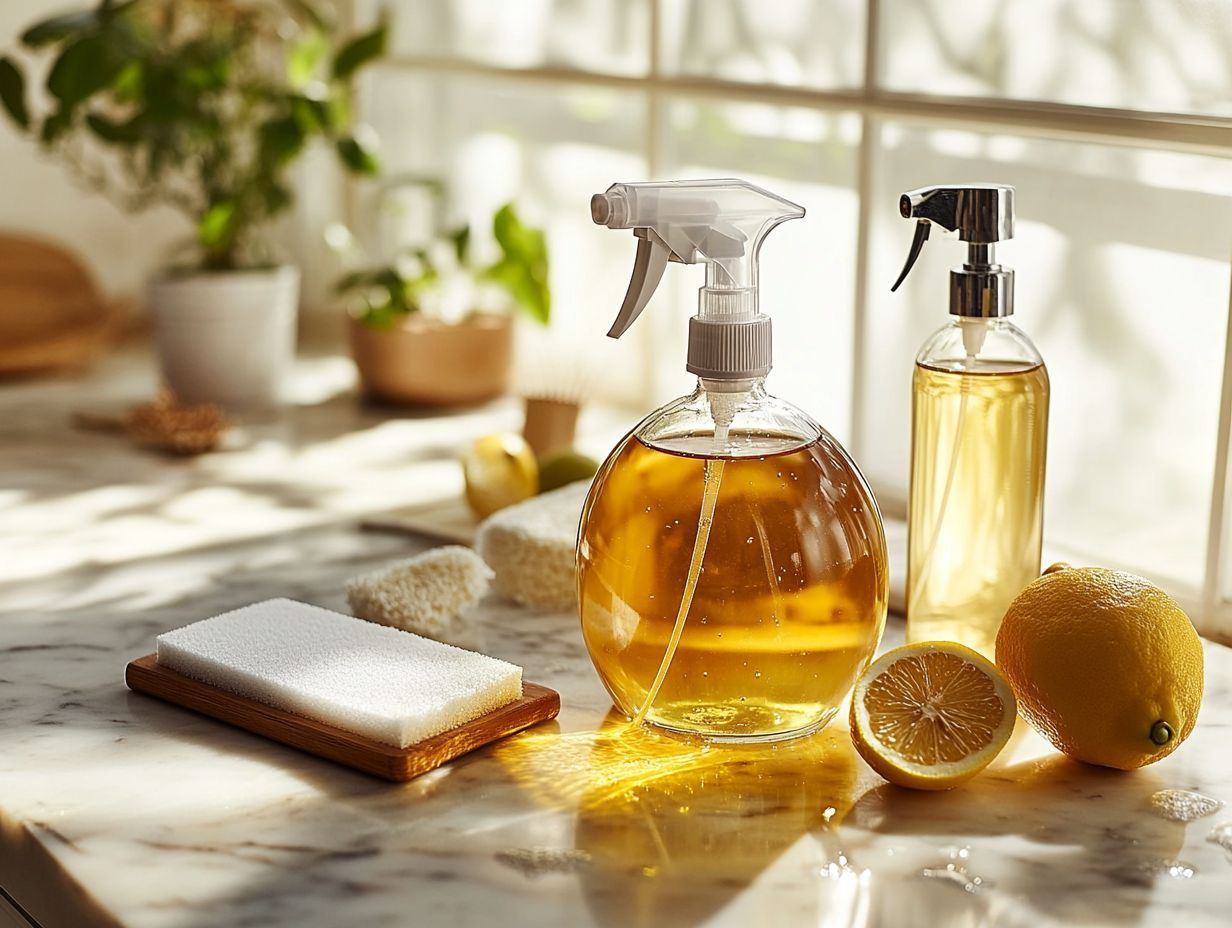
Yes, citric acid is a versatile household remedy. It works well for cleaning because it can naturally remove stains, grime, and buildup.
What Types of Surfaces Can I Use Citric Acid On?
Citric acid is effective on various surfaces. You can use it on fabrics, glass, kitchen countertops, bathroom fixtures, tiles, and even stainless steel appliances.
How Do I Use Citric Acid for Cleaning?
To clean with citric acid, dilute it with water. Spray or apply it directly onto the surface, let it sit for a few minutes, then wipe it off with a damp cloth.
Can I Use Citric Acid Instead of Other Household Cleaners?
Absolutely! Citric acid is a natural alternative to harsh chemical cleaners. It s safe around children and pets and has antibacterial properties for effective disinfection.
Are There Precautions When Using Citric Acid for Cleaning?
Yes, always wear gloves when handling concentrated citric acid. Avoid contact with your eyes, and test a small area before applying it on delicate surfaces.
Can I Use Citric Acid for Cleaning My Dishwasher or Washing Machine?
Yes, citric acid can safely clean your dishwasher and washing machine. Just add a tablespoon of citric acid powder to the detergent compartment and run a cycle. This method removes hard water stains and soap scum and can even substitute for vinegar. For a pleasant scent, consider adding essential oils!

